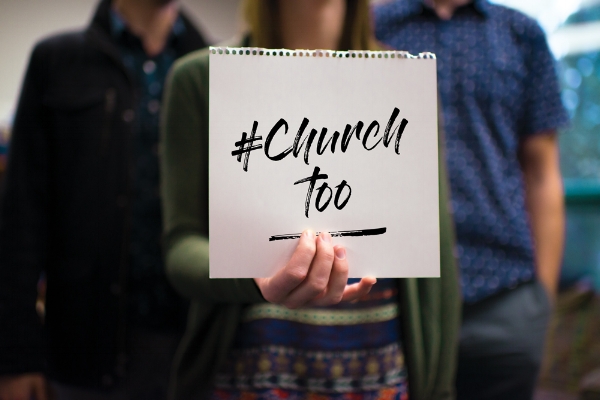We need to acknowledge #metoo and #churchtoo happens right here in Canada, and even in beautiful, small, “innocent” Atlantic Canada.
In case you’ve missed it the #metoo movement started back in the fall of 2017 as social media movement against sexual harassment and sexual abuse. It began a floodgate of people (millions!), both famous and ordinary people, sharing their stories of sexual assault, acknowledging it had happened to them.
Shortly after the #metoo movement began the #churchtoo movement also began on social media, inviting people to acknowledge that sexual harassment, abuse and assault happens within church and faith communities too. This movement continues to bring to light stories of individuals harmed and stories of our failure as religious communities and institutions to respond well to sexual harassment, abuse and assault.
Yes, I know far too many stories of #metoo and #churchtoo happening among OUR faith communities, in our churches, in our camps, in our youth groups, in our kids’ ministries, in our families and in our neighbourhoods.
Heartbreaking stories.
Stories that made me literally sick to my stomach.
Stories that make me shutter at how victims have been treated by church processes and leaders in our churches.
Stories that make me weep with the damage done, that rarely has been fully acknowledged.
Stories that make me shake my head, and my fists, at leadership.
Stories that make me cry out “How long O Lord?”
Stories that make me long for justice.
May your story be brought into the light, and it be a safe place for truth and a safe place for you to begin healing.
I long for our churches to be a safe haven – where victims are believed and people know how to respond to them with compassion and helpful steps.
“If it takes a village to raise a child, it takes a village to abuse one.” stated Mitchell Garabedian in the film Spotlight.
We need to acknowledge and be willing to examine what has allowed for on-going cases of harassment and abuse to happen in our village. What is it about our environment, culture, opportunities and systems that could be contributing in small or big ways to a village, a church, where this kind of treatment continues to take place?
As I begin to brainstorm, here are some of the things I believe we need to be willing to question in our faith communities: religious patriarchy, nepotism, some of the teachings around purity culture, taboo topics for discussion, over-emphasis of certain theologies like grace and forgiveness over other theologies like caring for the oppressed and broken-hearted, the power given to leaders, our leadership structures, misunderstanding and bad teaching around what it means to “submit” to one another, our inter-connectedness and inbreeding particularly in Atlantic Canada that leads to a culture of secrecy and self-protectiveness…just to name a few.
Let’s be willing to bring everything into the light, and examine these things carefully for how they may be contributing to church culture where #metoo and #churchtoo is allowed to continue and victims are silenced.
Here are three big things that have to be in the culture of our churches if we are going to be able to change the outcome of #churchtoo stories and stop so many from happening in the first place.
1. Listen well
Create a culture of honesty, where victims are believed when they come forward. Believe them, take their story seriously and support them. It’s authorities (e.g. Social services, police…) job to investigate and figure out the truth of the situation, not ours. Believe their story and take it seriously. This takes valuing the voice of women and girls, valuing the voice of the vulnerable, and even valuing the voice of outsider. Listen to those, even outsiders, who say our system is broken and can help us see the things in our church cultures that are unhelpful to victims. Unfortunately, it often times seems in these #churchtoo stories churches are more concerned with protecting the church and the reputation of leaders than they are concerned about victims. Our God hears the cries of the oppressed, but it seems churches give the oppressor(s) more attention rather than the oppressed. Jimmy Hinton puts it this way “They care for, protect, and nurture the wolf while the sheep are left out to fend for themselves unaware that a wolf is in the sheep pen eyeing the ewe lambs.”
2. Cultivate compassion for the vulnerable
There is certainly lots of rich Biblical teaching around compassion to be understood and practiced. I’m also thinking here of really practical things like having policies and practices that make things safer for the vulnerable – including good, up-to-date child abuse response and prevention plans (CBAC SafeR Church.) Have a plan of how to respond with compassion when harassment, unwanted attention, and abuse are brought to light. Make sure to include in the plan appropriate responses to care for victims and appropriate consequences for those who mistreat the vulnerable.
Let’s also be sure we’re not teaching that silence is spiritual. Silence is not spiritual. Silence is not compassionate – and ends up helping neither the victim nor the abuser in getting needed help. God helps us bring to light that which was hidden in darkness. Let’s also be careful not to tell victims far too quickly to forgive, or even be reconciled, when it would not be safe or wise to do so. Show compassion.
3. Teach and model respect for all genders and all people
I do worry what we are teaching this younger generation about what it means to be respectful men, women, boys and girls, with respectful relationships with people of all genders.
Teach and model a theology of personhood, that helps people understand the depth of reality that every single person is made in the image of God, and is therefore worthy of our highest respect. It doesn’t matter how messed up, broken, marred by their sin, marred by others sin, their background, or anything else – everyone we meet (in real life and virtually) is created in the image of God and absolutely deserves being treated with sacredness because of that. Let’s start there – it leaves no room for disrespect, for mis-treatment, or for disbelieving someone’s story.
Teach about consent and what it means as a follower of Jesus. Don’t just say “Don’t do ‘it’ until your married,” that’s not helpful to anyone and does not give any real tools or language to handle real life situations. Teach that your body is precious, the temple of Holy Spirit, and you have the absolute right, any time, anywhere, with anyone, to speak up if something makes you uncomfortable, is inappropriate or simply unwanted. You have the right to speak up in the situation, after the situation, and years after the situation. Give boys and girls, men and women, everyone, words for consent – what it means to ask for it, respect it, and give it. Give boys and girls, men and women encouragement to believe their conscious, the Holy Spirit nudges – when something doesn’t feel right or makes them feel uncomfortable – to get out and tell someone they trust.
Those are 3 things that could start to change our church culture around this.
I’ve also been reflecting on the way of Christ in this.
How would Jesus Himself engage the #metoo and #churchtoo movement?
We’ve got a lot of clues to how He’d react looking at His life as recorded in the Gospels and watching the compassion with which faithful Christ followers today are standing with victims.
Notice Jesus’ engagement:
Listening to their heart – Jesus listens to the person, their heart, regardless of their reputation in the world or the language or theology they use in explaining their story or stance. He values the downtrodden and victim. Consider the woman at the well (John 4:1-26). Jesus wasn’t tainted by her reputation of having had 5 husbands and now being with another man, He saw someone needing living water, needing to be listen to and valued.
Jesus let a woman of questionable character wash his feet (Luke 7:36-50) with her tears, perfume and her hair WITHOUT letting any of the men & boys around him turn it into anything sexual or seductive.
Jesus stood with the oppressed, writing in the sand, while those wanting to accuse her and throw stones at her, and defend their stance, defend their ‘righteous’ accusations of her – slowly walked away as Jesus’ compassion trumped their accusations. (John 8:1-11)
Jesus identified with the victim, every victim, become a victim of an oppressive, unfair system Himself, being hung on a cross. (Mark 15:27-32)
God will hear the cry of the oppressed and not letting abusers and oppressors get away with it. For example, in Exodus 22:21-23 it says “Do not mistreat or oppress a foreigner, for you were foreigners in Egypt. Do not take advantage of the widow or the fatherless. If you do and they cry out to me, I will certainly hear their cry.” Jesus clearly upheld freeing the oppressed, in fact, stating this is part of why he came (Luke 4:18-21) and that when He returns we’ll judge us for what we did NOT do to look after the hungry, thirsty, poor, oppressed, and oppressive systems among us (Matthew 25:31-46).
May things that have been hidden in the darkness brought to light.
May we know how to handle that which is brought into the light with Jesus’ compassion, Spirit of grace & truth and deep love.
May we know how to love each other as brothers and sisters in Christ.

